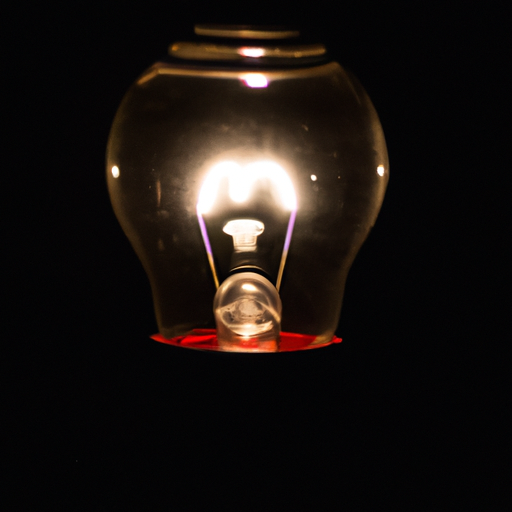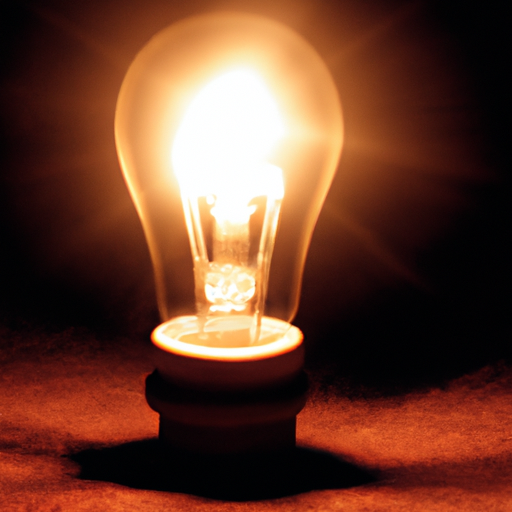Have you ever experienced a sudden power outage and found yourself unprepared? It can be a frustrating and inconvenient situation, but fear not! In this article, we will discuss how you can adequately prepare for a power outage, so you can stay calm, comfortable, and connected during those unexpected times.
When a power outage occurs, it’s essential to have a plan in place to ensure you and your loved ones are well-prepared. Firstly, it’s crucial to create an emergency kit that includes essential items such as flashlights, batteries, a first aid kit, non-perishable food, and water. This kit will help you navigate through the darkness and ensure your basic needs are met. Additionally, consider investing in a portable power generator or solar-powered chargers for your electronic devices, as they can be a real lifesaver during an extended blackout. So, grab a cup of coffee, sit back, and keep reading – we’ll explore more ways on how you can be ready for a power outage in the rest of this article.
Understanding Power Outages
Causes of Power Outages
Power outages can occur for various reasons, ranging from natural disasters to equipment failures. Some common causes include severe weather conditions such as thunderstorms, hurricanes, or snowstorms that damage power lines and transformers. Other causes may include accidents like car crashes or excavation work damaging underground cables. Equipment failures, such as overloading or malfunctions, can also lead to power outages.
Impact of Power Outages
Power outages can have a significant impact on individuals and communities. When the electricity goes out, essential services like heating, cooling, and refrigeration are lost. It can disrupt communication channels, leaving people without access to phones and the internet. Power outages can also affect businesses and industries, causing financial losses and disrupting day-to-day operations. In addition, public safety can be compromised as street lights go out and security systems become inoperable.
Duration of Power Outages
The duration of a power outage can vary greatly depending on the cause and extent of the damage. Minor outages caused by temporary faults or maintenance work may last only a few minutes to an hour. However, more severe outages caused by natural disasters or equipment failures can last for several hours, days, or even weeks. It is essential to be prepared for a longer outage to ensure the well-being and comfort of both yourself and your family.
Emergency Kit Preparation
Basic Supplies
When preparing for a power outage, it is crucial to have a well-stocked emergency kit. Include items such as flashlights, batteries, a manual can opener, and a toolkit that includes essential tools. It is also wise to have a battery-powered or hand-cranked radio to stay updated on news and weather updates. Additionally, consider having a whistle or an alarm to signal for help if needed.
Food and Water
Having an ample supply of non-perishable food items is essential during a power outage. Stock up on canned goods, dry snacks, and other items that do not require refrigeration or cooking. Don’t forget to keep a supply of bottled water as well. Aim to have at least one gallon of water per person per day for a minimum of three days.
Medication and First Aid
If you or any family member requires medication or medical equipment, ensure you have an adequate supply on hand. Keep a list of medications and dosage instructions in your emergency kit. Additionally, have a well-stocked first aid kit that includes bandages, antiseptic ointment, pain relievers, and any other necessary medical supplies.

Alternative Power Sources
Generators
Investing in a generator can provide a reliable source of backup power during an outage. It is essential to choose a generator that meets your specific needs and can power essential appliances like refrigerators, heaters, or medical equipment. Remember to follow all safety guidelines when operating a generator and never use it indoors to prevent carbon monoxide poisoning.
Solar Power
Solar power can be an excellent alternative source of energy during a power outage. Installing solar panels allows you to generate electricity from the sun, reducing reliance on the grid. Additionally, solar-powered battery systems can store excess energy, providing power when the sun is not shining. While solar power systems require an upfront investment, they can provide long-term savings and environmental benefits.
Battery Backup System
Another alternative power source is a battery backup system. These systems use rechargeable batteries that can store electricity when the power is on and provide power during an outage. Battery backup systems are typically more affordable than generators and can be used to power essential devices like lights, medical equipment, or communication devices.
Home Safety Measures
Electrical Safety
During a power outage, it is important to take precautions to ensure electrical safety. Avoid using candles as they can pose a fire hazard. Instead, rely on flashlights or battery-operated lanterns. Unplug appliances and electronics to prevent damage from power surges when the power is restored. If using a generator, follow all safety guidelines and never overload it.
Fire Safety
Power outages increase the risk of fires, so it is crucial to prioritize fire safety. Test smoke detectors regularly and keep a fire extinguisher readily accessible. In the event of a power outage, avoid using alternative heating sources like portable propane or kerosene heaters indoors, as they can release harmful gases or cause fires.
Carbon Monoxide Awareness
Carbon monoxide (CO) poisoning is a serious risk during a power outage if using alternative heating sources or generators. Make sure to have carbon monoxide detectors installed in your home and check them regularly to ensure they are functioning correctly. Never run a generator or use outdoor cooking equipment indoors, as they can produce toxic levels of carbon monoxide.

Communication and Information
Portable Radio
Staying informed during a power outage is vital. A battery-operated or hand-cranked radio can provide you with access to the latest news and weather updates. Make sure to have extra batteries or a hand-cranked radio to ensure continuous communication.
Cell Phone Charger
Keep a portable charger or a power bank for your cell phone to ensure you can stay connected and reach out for help if needed. Consider having a car charger as well, as you can charge your phone while driving.
Emergency Contact List
Create a list of emergency contacts and keep it in your emergency kit. Include numbers for local utility companies, emergency services, family members, and friends. In case of a power outage, it is essential to have these numbers readily available, especially if you need to report an emergency or request assistance.
Energy Conservation Tips
Unplugging Electronics
Unplugging electronics and appliances that are not in use can help conserve energy. Even when turned off, many devices continue to draw power, known as “standby power” or “phantom load.” Unplugging these devices not only saves energy but also reduces the risk of power surges when the electricity is restored.
Using Energy-Efficient Lighting
Consider switching to energy-efficient lighting options such as LED bulbs. LED bulbs use significantly less energy than traditional incandescent bulbs, saving you money in the long run. During a power outage, having battery-powered LED lanterns or flashlights can provide adequate lighting while conserving energy.
Insulating Doors and Windows
Properly insulating doors and windows can help retain heat during a power outage in colder climates or keep cool air inside during a hot summer outage. Use weather stripping or draft stoppers to seal any gaps or cracks in doors and windows, minimizing heat loss or gain.
Food Safety Guidelines
Optimizing Refrigerator and Freezer
During a power outage, it is important to minimize food spoilage and maintain food safety. Keep refrigerator and freezer doors closed as much as possible to retain the cold air. A refrigerator can keep food cold for about four hours, while a full freezer can maintain its temperature for around 48 hours. Consider placing perishable items in coolers with ice to extend their shelf life.
Minimizing Food Waste
To reduce food waste during a power outage, try to plan meals ahead of time and prioritize consuming perishable items first. Opt for non-perishable foods and snacks from your emergency supply kit. Remember to discard any perishable items that have been above 40°F for more than two hours to prevent food poisoning.
Cooking without Power
If you need to cook during a power outage, it is best to use alternative cooking methods that do not rely on electricity. A gas-powered stove, camping stove, or grill can provide a means for cooking food. If using charcoal or gas grills, ensure proper ventilation is maintained to prevent carbon monoxide buildup.
Preparing Your Home
Securing Windows and Doors
Before a power outage occurs, take the time to secure windows and doors. Reinforce windows with storm shutters or plywood panels to protect them from damage during severe weather events. Ensure all doors are properly fitted and have weather stripping to prevent drafts and heat loss.
Backup Power for Essential Appliances
Consider investing in a backup power supply for essential appliances like refrigerators, sump pumps, or medical equipment. This could be in the form of a generator or battery backup system. Having backup power for these appliances can ensure their continuous operation during a power outage.
Stocking Up on Essential Supplies
Prepare your home by stocking up on essential supplies, such as non-perishable food, bottled water, medications, and personal hygiene items. It is recommended to have enough supplies to last a minimum of three days. Additionally, keep a supply of blankets, warm clothing, and extra batteries readily available.
Emergency Evacuation Plan
Identifying Escape Routes
In cases where a power outage is accompanied by other emergencies or hazards, it is essential to have an evacuation plan in place. Identify multiple escape routes from your home and have a designated meeting point for your family to gather. Practice your evacuation plan regularly to ensure everyone knows what to do in an emergency.
Meeting Points
Choose a meeting point outside your immediate neighborhood where your family can gather if you need to evacuate. This location should be easily accessible and familiar to all family members. Having a specific meeting point ensures that everyone can reunite and provides peace of mind during a stressful situation.
Emergency Kit for Evacuation
Prepare a compact emergency kit that you can easily grab in case of an evacuation. Include essential items like identification documents, cash, medication, a change of clothes, and any necessary supplies for children or pets. Having an evacuation kit ready can save valuable time during an emergency.
Conclusion
Preparing for a power outage is essential for ensuring the safety, comfort, and well-being of yourself and your family. By understanding the causes and impacts of power outages, you can take appropriate measures to minimize their effects. Creating an emergency kit, considering alternative power sources, implementing home safety measures, staying informed, conserving energy, and planning for food safety are all crucial steps in being prepared. By taking these actions, you can have peace of mind knowing that you are ready for the unexpected and able to navigate power outages with confidence.